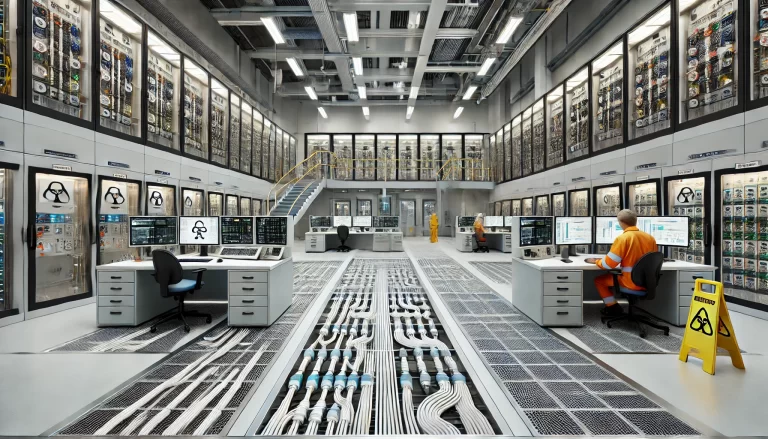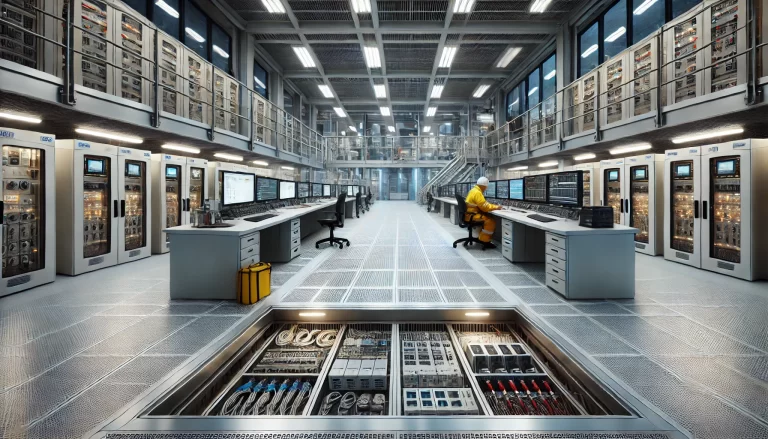In chemical plants, control rooms—including central control rooms, on-site control rooms, and equipment cabinet rooms—serve as the nerve centers of operations. These spaces house a variety of high-precision electronic devices, such as computers, servers, and communication equipment, which are essential for monitoring and controlling production processes. Given the sensitivity of these devices, the implementation of anti-static flooring plays a critical role in ensuring equipment safety, operational efficiency, and overall system stability. This article explores the importance and benefits of anti-static flooring in chemical plant control rooms.
1. Preventing Electrostatic Damage to Electronic Equipment
Electronic devices in control rooms are highly susceptible to electrostatic discharge (ESD). Static electricity can accumulate unnoticed on surfaces, clothing, and even equipment casings. When the accumulated charge discharges suddenly, it can result in extremely high voltage spikes—enough to damage or even destroy delicate electronic components such as microchips and circuit boards.
Anti-static flooring is specifically designed to prevent static electricity build-up and facilitate its safe dissipation. The flooring typically consists of conductive materials that allow static charges to be redirected harmlessly into the ground. This process prevents the accumulation of charges on equipment surfaces and minimizes the risk of damage caused by sudden electrostatic discharges.
In addition to preventing equipment damage, anti-static flooring also reduces the risk of data corruption and system failures, which can have severe operational and financial consequences in a chemical plant.

2. Facilitating Efficient Cable Management and Maintenance
In control rooms, complex networks of power cables, data lines, and communication wires are essential for device connectivity and system operations. Traditional flooring systems often struggle to accommodate these cables efficiently, leading to tangled wires, tripping hazards, and increased difficulty during maintenance.
Anti-static flooring systems are typically raised floors, creating a concealed space underneath. This design offers several significant advantages:
- Organized Cable Layout: Cables can be routed in an orderly manner, reducing clutter and ensuring clear identification of connections.
- Ease of Maintenance: Technicians can access cables easily for inspection, replacement, or repairs by simply lifting specific flooring panels.
- Improved Air Circulation: The space beneath raised anti-static flooring can also support air circulation systems, helping to regulate temperature and prevent overheating of critical equipment.
- Enhanced Safety: Properly concealed cables reduce the risk of accidental damage or exposure, improving overall workplace safety.
Well-organized cabling improves the long-term reliability of control room operations, reduces the chances of malfunctions, and minimizes downtime during maintenance activities.
3. Material Selection and Durability of Anti-Static Flooring
Anti-static flooring is available in various materials, each suited to different operational requirements. The two most common types are:
- PVC Anti-Static Flooring: Known for its flexibility, cost-effectiveness, and excellent anti-static properties, PVC flooring is often used in control rooms where moderate durability is sufficient.
- Steel Anti-Static Flooring: Made with a steel structure, this type offers superior load-bearing capacity, durability, and long-term reliability. It is ideal for environments where heavy equipment is installed.
Both materials are designed to meet international standards for electrostatic discharge control and are typically easy to clean and maintain.
When choosing anti-static flooring, factors such as the operational environment, equipment load, and maintenance requirements should be carefully considered to ensure long-term performance and cost efficiency.
4. Enhancing Workplace Safety and Compliance
Chemical plants operate under strict safety and compliance standards due to the presence of volatile substances and hazardous materials. Static electricity, if not managed properly, can not only damage sensitive equipment but also pose significant safety risks, including the potential for fire or explosions in certain conditions.
Anti-static flooring contributes to:
- Workplace Safety: By preventing sudden electrostatic discharges, the flooring reduces the likelihood of ignition hazards in volatile environments.
- Compliance with Regulations: Many safety standards and industry regulations require the use of anti-static flooring in sensitive areas like control rooms. Proper installation ensures compliance and reduces legal and operational risks.

5. Long-Term Cost Efficiency
While the initial investment in anti-static flooring may seem significant, its long-term benefits outweigh the costs. Preventing damage to expensive electronic equipment, reducing downtime caused by system failures, and minimizing maintenance costs contribute to significant savings over time.
Additionally, the durability of high-quality anti-static flooring ensures a long service life, reducing the frequency of replacements or major refurbishments.
Conclusion
The installation of anti-static flooring in chemical plant control rooms is not merely an option but a necessity. Its ability to prevent electrostatic damage, facilitate efficient cable management, enhance safety, and ensure compliance with regulations makes it an essential component of any modern control room.
When designing or upgrading control rooms, plant managers and engineers should prioritize high-quality anti-static flooring solutions tailored to their operational needs. By doing so, they can safeguard critical equipment, enhance operational efficiency, and create a safer working environment for personnel.
In conclusion, anti-static flooring serves as a fundamental investment in both the safety and reliability of chemical plant control systems, ultimately contributing to uninterrupted productivity and long-term sustainability.
